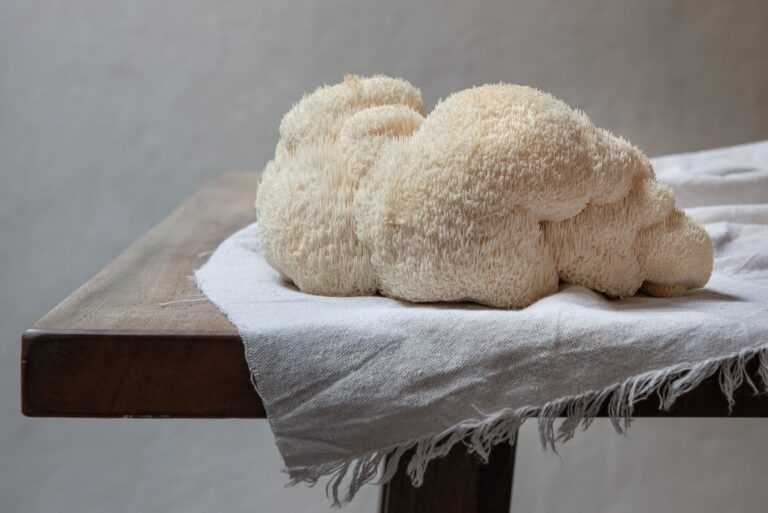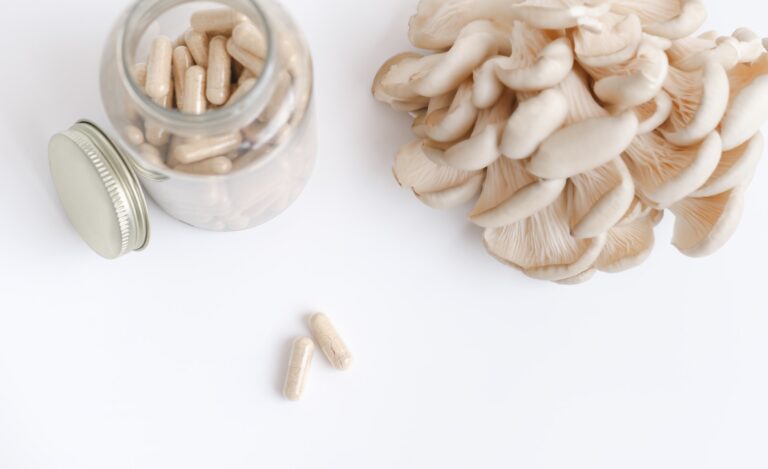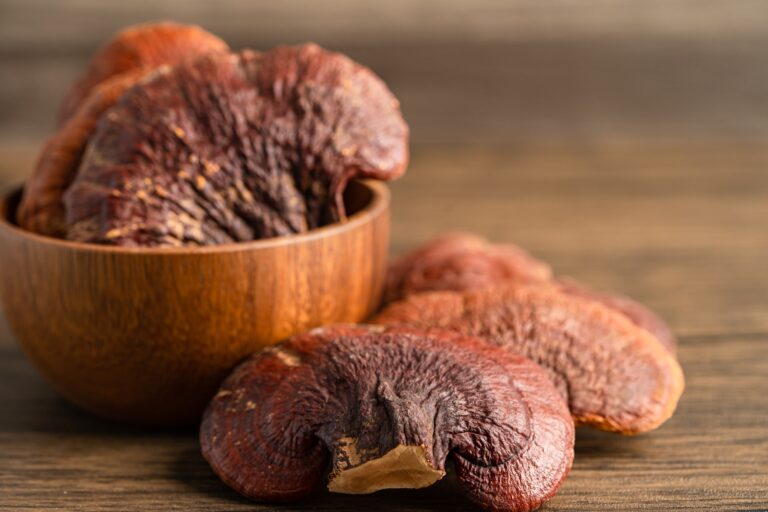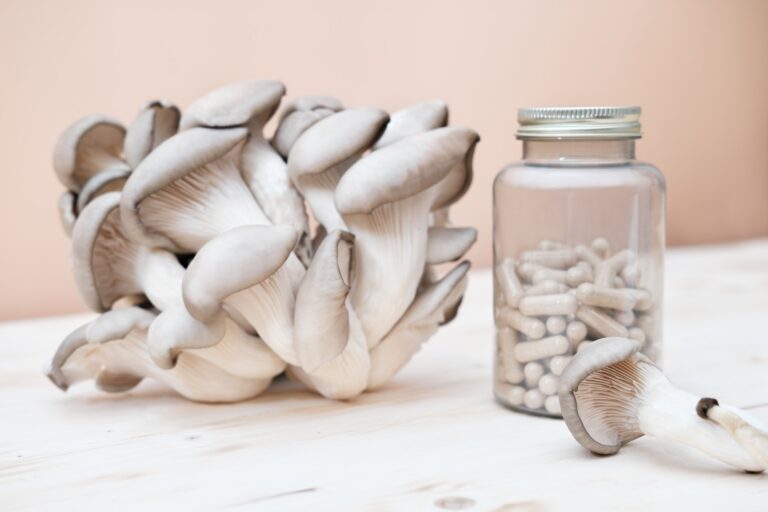
5 Menopause Support Complex Supplement to Help Ease Symptoms
Menopause support complexes are dietary supplements with herbal extracts and vitamins aimed at alleviating symptoms during menopause
Whether you’re an avid foodie, an expert in nutrition, or just looking to boost your diet with natural ingredients, you may have come across the increasing popularity of lion’s mane mushroom and reishi mushroom. This superfood duo has been gaining traction due to their benefit of providing a range of health and vitality benefits. But what exactly makes these mushrooms so special? This blog post will explain the power of lion’s mane and reishi mushrooms, their health benefits, and the various ways you can include them in your diet. Let’s dig in and unlock the true power of lion’s mane and reishi mushrooms!
Mushrooms have been used to benefit both physical and mental health for centuries. Lion’s Mane and Reishi mushrooms are two of the most popular varieties that are often touted for their purported health benefits.
Lion’s Mane is a white/gray mushroom that resembles a lion’s mane, hence its name. It is native to North America, Europe, and Asia and grows on hardwood trees. Its fruiting body contains polysaccharides, hericenones, and erinacines, which give it antioxidant and anti-inflammatory properties.
Reishi (Ganoderma lucidum) is another medicinal mushroom native to East Asia. It is also known as “The Mushroom of Immortality” due to its long history of being used in Asian medicine. It’s thought to contain bioactive compounds including polysaccharides, triterpenes, lectins, coumarin derivatives and amino acids.

Evidence exists regarding the potential health benefits associated with Lion’s Mane and Reishi mushrooms for immune support, cognitive function, gastrointestinal function, and more. However there is still ongoing debate about the effectiveness of mushroom-derived supplements in providing such health benefits. While some may argue that mushrooms should be consumed as food for maximum benefit due to their natural elements, others say that despite food being nutritionally dense, nutritional supplements are more convenient and are still beneficial when taken as prescribed by medical professionals.
Both Lion’s Mane and Reishi mushrooms are known for their potent medicinal benefits due to their high concentrations of polysaccharides, beta-glucans and antioxidants. A wealth of research has suggested that consuming both mushrooms can improve immunity, reduce inflammation and prevent chronic diseases.
The health benefits of Lion’s Mane are numerous and range from improving cognitive function by boosting nerve growth factor (NGF) in the brain, to delivering powerful antioxidant activity in the body. Furthermore, Lion’s Mane may be beneficial for those with digestive distress, as it is known to aid digestion and help fight hangovers.
Reishi mushroom is one of the most sought after medicinal mushrooms due to its multitude of health benefits. It has been shown to boost the immune system and protect against infectious diseases, reduce fatigue, lower cholesterol and improve cardiovascular health, as well as boost detoxification pathways. What’s more, Reishi also shields skin from damage and boosts overall longevity.
When consumed together, these two superfood mushrooms work synergistically to create a powerful concoction that can potentially elevate all areas of health. While there may be disagreements about how effective the combination is compared to taking them separately, the evidence provided thus far does suggest that reaping the full benefits of Lion’s Mane and Reishi could require using them in tandem.
Despite this debate, there is no denying the impact these two mushrooms can have on our overall health when consumed regularly in an appropriate dosage. With such promising results in studies so far, it is only natural to investigate further how both Lion’s Mane and Reishi mushrooms could provide even more immune system support than what we already know today.

It is well known that Lion’s Mane and Reishi mushrooms are powerful allies in aiding our bodies’ natural defense systems and it has been suggested to treat and/or prevent a wide array of illnesses. Lion’s Mane has been linked to stimulating the production of NGF, a form of protein thought to play a role in protective brain functions. Its beta-glucan content also activates macrophages, special cells known for helping modulate the inflammatory responses in our bodies. Similarly, Reishi mushrooms have a long history in traditional Chinese medicine as an herbal remedy for common ailments such as heart disease, fatigue, headaches, colds and flus. Studies have shown the Reishi mushroom is extremely high in antioxidant properties – a substance known to help defend cells from free radicals which can damage cell DNA and cause health problems. However, there is no direct scientific evidence that suggests taking only these two mushrooms together will enhance or boost your immune system against any specific illness or diseases.
The potential stress & cognitive benefits of Lion’s Mane and Reishi mushrooms are not to be overlooked in the context of immune system support. Studies suggest that the compounds found within these two powerful fungi are notable for their anti-inflammatory and anti-oxidative potential, meaning they may help to reduce stress. Lion’s Mane is said to have a stimulating effect on nerve growth factor (NGF), which aids in speeding up cognitive processes. Other reports have suggested that Lion’s Mane can also improve both mood and memory. On the other hand, Reishi possesses adaptogenic properties, allowing it to mitigate the effects of stress and anxiety whilst promoting clarity and focus.
As such, the combination of these two unique species of mushroom could prove beneficial for those looking to achieve enhanced focus, improved mental performance and overall reduced feelings of stress. By establishing a regular routine involving both Lion’s Mane and Reishi, you can rest assured knowing that your brain chemistry is being well looked after.
Now that we’ve considered how these medicinal mushrooms may help support our immune systems as well as level out our moods, let’s turn our attention to longevity & natural remedies – a topic just as important as those we’ve already discussed.
The longevity and natural remedies associated with Lion’s Mane and Reishi mushrooms have been a source of interest due to their potential therapeutic benefits against age-related illnesses. Research suggests that their components have antioxidant, anti-inflammatory, and immunomodulatory effects. Not only this, but Suncus etruscus, commonly known as the Mediterranean Musky Shrew, has been found in research to live three times longer than any other rodent due to its consumption of Reishi. This evidence would suggest an increased lifespan for humans when regularly consuming these mushrooms.
On the other hand, some scientists dispute this claim as potential evidence for effective longevity for humans. This is because Suncus etruscus are a species of shrews that evolved biologically different from any human species, making it possible that the results may not be applicable to us. To support this side of the debate, research still needs to be conducted on primates or rodents more closely related to humans before anything can be concluded.
Whatever the outcomes may be, there is no denying that Lion’s Mane and Reishi mushrooms provide natural remedies for common ailments such as colds and fatigue or mental clarity and mood elevation. With their additional potential benefits for longevity, it seems that we should further explore these hidden powers for overall health benefits. Although further research is needed to assess their true efficacy, let us now turn our attention towards Traditional Chinese Medicine (TCM) and how it has used these two types of mushrooms for centuries in its healing practice.
Traditional Chinese Medicine (TCM) is a holistic approach to healthcare that has been practiced for literally thousands of years. One of the foundations of this ancient healing system is the belief that all of us are connected to natural forces, and that by incorporating natural remedies such as herbs and mushrooms into our lives, we can achieve better physical and mental health.
For centuries, the Lion’s Mane and Reishi mushroom have been valued staples of Chinese medicine. In TCM, specialists believe that Lion’s Mane promotes healthy circulation in the brain, lungs, and heart; while Reishi helps to provide protection from stress and anxiety. There has been some scientific research done to support these traditional beliefs; it was found that both mushrooms contain antioxidants which fight inflammation and promote overall tissue integrity.
The use of these mushrooms in Traditional Chinese Medicine not only supports longevity but also provides many other potential benefits for mental and physical wellbeing. As such, it’s no wonder why they have become common solutions for overall health optimization among practitioners all over the world.
However, it is important to remember that there hasn’t been comprehensive research on human subjects when it comes to the traditional uses of Lion’s Mane and Reishi mushrooms. While evidence currently available supports their beneficial applications, further studies should be conducted in order to fully understand their widespread potential.

Understanding how to use Lion’s Mane and Reishi mushrooms can be beneficial for a variety of purposes, from enhancing cognitive functions to managing stress. These two medicinal mushrooms are extensively utilized in Traditional Chinese Medicine (TCM) and are said to provide numerous health benefits. While there is some disagreement about the efficacy of these mushrooms, many studies suggest that Lion’s Mane and Reishi may have real potential for improving physical and mental health.
There are multiple ways to consume Lion’s Mane and Reishi mushrooms. They can be taken raw, cooked, or in powdered form. Powdered forms are often available as capsules and extracts, which allow consumers to measure out accurate doses more easily than when working with whole mushrooms. For those seeking an energizing experience, powdered forms of these medicinal mushrooms can also be added to smoothies or elixirs.
Given their popularity in TCM, there is a debate among modern practitioners as to the efficacy of Lion’s Mane and Reishi mushrooms. Some argue that this practice originated centuries ago before humans had access to scientific literature-based evidence; therefore, it cannot be relied upon for reliable results. Others assert that traditional beliefs must be taken seriously because they were grounded in practical wisdom gained from many generations in the same culture. Evidence suggests that Lion’s Mane and Reishi may indeed contain active compounds that help promote health and wellness. For example, research indicates that these mushrooms contain bioactive compounds like polysaccharides and triterpenes that can help reduce inflammation and improve mental alertness.[1]
In any case, properly using Lion’s Mane and Reishi necessitates a thoughtful approach since some people may experience unwanted side effects if not taking the appropriate dosage amounts or if they have allergies to either mushroom species.[2] It is best to always consult a medical professional before adding any supplements to your diet or changing your lifestyle habits. Ultimately, as with any supplement or herb used medicinally, it is important to seek advice when learning how to reap its benefits safely while avoiding undesired effects.
[1] Yagi M & Brobst DE (2010). Health Benefits of Mushrooms: An Update. Nutrition Today 45(5): 224–234
[2] Panda S & Kar A (2013). Immunomodulatory Effects of Medicinal Mushrooms. International Journal of Medicinal Mushrooms 15(4): 279–291

There is a growing body of scientific evidence to support the efficacy of Lion’s Mane and Reishi mushrooms. Multiple clinical, animal, and in vitro studies have all found that Lion’s Mane and Reishi show promise in treating conditions such as anxiety and depression, cognitive decline, neurodegenerative diseases, and even cancer and HIV/AIDS. For example, one study published in 2017 showed that Lion’s Mane significantly improved mild symptoms of depression and anxiety in human participants. Similarly, a study conducted in 2021 showed that Reishi significantly reduced fatigue ratings from people with cancer-related fatigue. These studies suggest that both Lion’s Mane and Reishi offer potential therapeutic benefits for various health problems.
When using Lion’s Mane and Reishi mushrooms for maximum benefits, additional ingredients that should be taken are other medicinal mushrooms like Chaga and Cordyceps. The unique compounds of these medicinal mushrooms can help enhance the overall effects provided by Lion’s Mane and Reishi, effectively boosting their immune-modulating, anti-inflammatory, cognitive and antioxidant benefits. Additionally, it is beneficial to combine these mushrooms with adaptogenic herbs such as Ashwagandha and Holy Basil which can help reduce stress hormones, regulate cortisol levels and improve physical endurance. Lastly, make sure to take a Vitamin B complex to ensure your body is getting enough essential vitamins that are needed to allow these natural medicines to do their job.
Yes, there are potential risks associated with taking Lion’s Mane and Reishi mushrooms. Since they are dietary supplements, they are not regulated by the U.S. Food and Drug Administration (FDA). Furthermore, these products have not been evaluated by the FDA; therefore, their quality is not known. It is also important to understand that adverse reactions can take place when these products are combined with medication or medical conditions. As such, people should always consult with a healthcare professional prior to use of these dietary supplements, especially if they have any existing medical conditions or are taking any medications. Additionally, both Lion’s Mane and Reishi mushrooms may interfere with blood clotting and should be taken cautiously for those on anticoagulation-therapy or who have bleeding disorders. This could increase the chances of bleeding or bruising from taking these supplements. Finally, it is best to keep in mind that even though these mushrooms may come from natural sources, overconsumption could still lead to side effects like nausea, vomiting, headaches, and allergic reactions in some individuals. Therefore, it is best to consume them in moderation and under the guidance of a healthcare provider.

Menopause support complexes are dietary supplements with herbal extracts and vitamins aimed at alleviating symptoms during menopause

Vitamin C, D3, Zinc, and Quercetin support immune health. They enhance immune cell function, fight infections, reduce inflammation, and provide antioxidant benefits.

Ginseng, a valued herb with adaptogenic and antioxidant properties, is popular as a supplement for improved well-being, energy, and immune function.

Nootropic supplements enhance focus, memory, and cognitive function. They boost mental clarity, motivation, and creativity for improved performance and brain health.

Garcinia cambogia, a tropical fruit, is touted for weight loss. Its active ingredient, HCA, may inhibit fat formation, but evidence is limited. Consult a professional before use.

More and more people are jumping on the mushroom supplement bandwagon these days, but you should be aware that there are potential side effects you should know about before taking the plunge. Whether you’re begging for overall well being or looking for an extra performance boost, you’re going to want to make sure you’re making an informed decision before adding mushroom supplements to your daily routine. We’ve put together a list of potential side effects to look out for, so read on and learn the truth before you start popping those pills.

Moringa, the “miracle tree,” offers numerous benefits. Moringa supplements provide essential nutrients, antioxidants, anti-inflammatory effects, and potential blood sugar and cholesterol regulation. They support immunity and combat malnutrition, but medical advice is essential.

It’s a good thing that Mother Nature both created and found cures for many of the ailments we humans suffer from. From the common cold to serious diseases, herbs have the potential to not only alleviate symptoms, but to completely prevent illnesses in the first place! Herbal remedies for immune system support have become increasingly popular as natural ways to boost your immunity against illness start to catch on.
